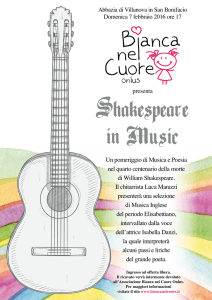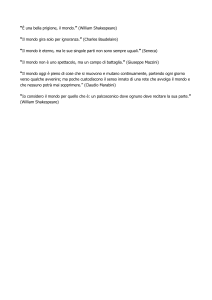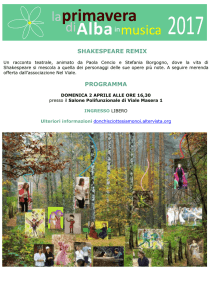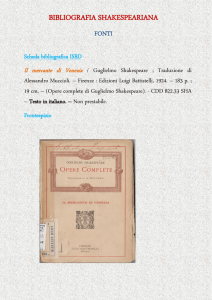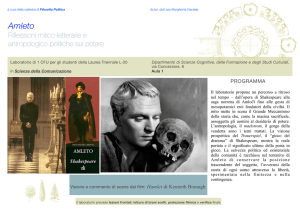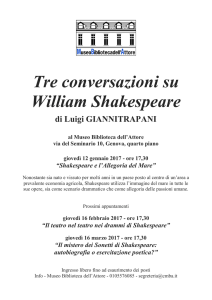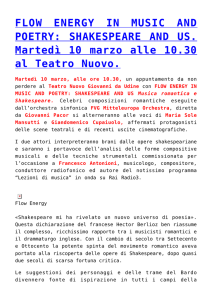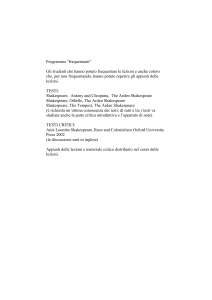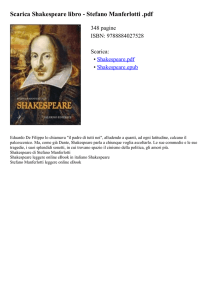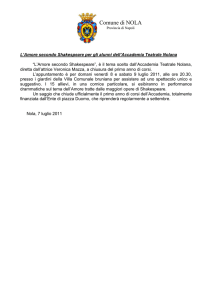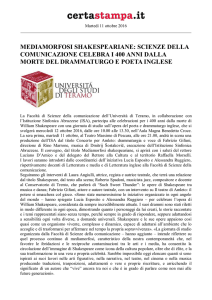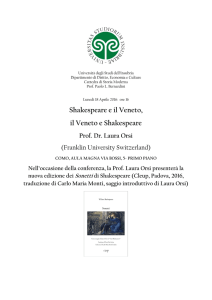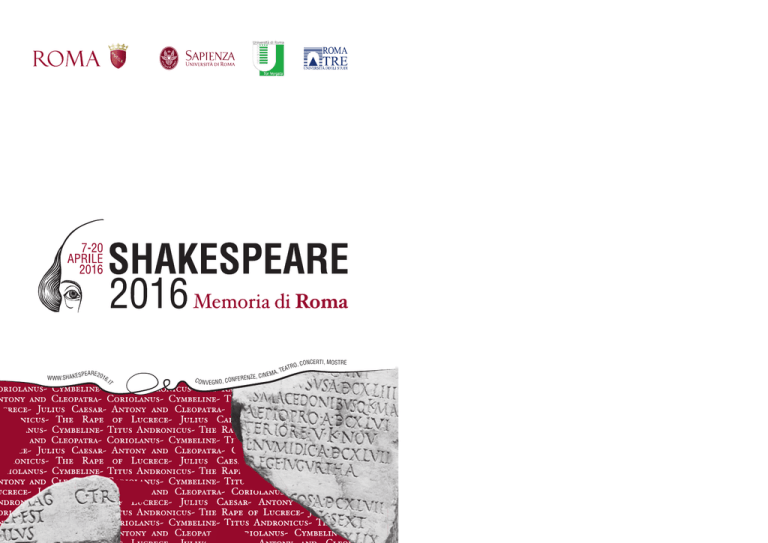
T
SPEARE2016
W WW.SHA KE
.I
, CONCERTI, MOSTRE
TRO
TEA
,
A
M
E, CINE
CON
NFERENZ
V EGNO, CO
A quattrocento anni dalla morte di William Shakespeare le Università di Roma e Roma
Capitale promuovono una serie di iniziative dedicate alla pervasiva presenza di Roma
antica nell’opera del grande drammaturgo. Dal 7 al 20 aprile cinema e teatro, concerti
e mostre accompagneranno un Convegno internazionale dedicato ai suoi drammi
romani, coinvolgendo diversi luoghi della Capitale.
To mark the 400th anniversary of William Shakespeare’s death, the public Universities
of Rome and the City of Rome have joined efforts to promote a series of events
exploring the pervasive presence of ancient Rome in the great playwright’s work. From
April 7th to the 20th, film screenings and theatrical performances, concerts and
exhibitions will be held along with an international conference on his Roman plays, in
some of the most evocative locations of the city.
Medaglia del Presidente della Repubblica
Indice/Contents
6 Presentazione/Foreword
Lombardo, Vanna Gentili,
8 Agostino
La Roma di Shakespeare/Shakespeare’s Rome
11 Programma/Programme
23 Abstracts
Roma Capitale
Sapienza Università di Roma, Università di Roma “Tor Vergata”, Università Roma Tre/
Sapienza University of Rome, The University of Rome Tor Vergata, Roma Tre University
In collaborazione con/In collaboration with
London Shakespeare’s Globe Theatre, Silvano Toti Globe Theatre Roma, Teatro di Roma, Teatro
Palladium, Teatro di Villa Torlonia, The British School at Rome, Accademia dell’Arcadia, Biblioteca
Alessandrina, Roma nel Rinascimento, Fondazione Roma Sapienza, Conservatorio Santa Cecilia,
Istituzione Universitaria dei Concerti, Casa del Cinema, Music Theatre International. E in particolare
con l’Istituto Italiano per la Storia Antica/And in particular with the Istituto Italiano per la Storia Antica.
Con il patrocinio di/With the patronage of
Presidenza del Consiglio dei Ministri, MIBACT, MIUR, UNESCO, the Embassy of the United Kingdom,
British Council Italy, American Academy in Rome, ESRA, AIA, ANDA, IASEMS.
6
Presentazione
Foreword
Cuore propulsivo delle iniziative è il convegno internazionale Shakespeare e la
memoria di Roma, il quale, a partire dalle opere di ambientazione romana (Titus
Andronicus, The Rape of Lucrece, Julius Caesar, Antony and Cleopatra, Coriolanus,
Cymbeline), aspira a cogliere il significato profondo della presenza di Roma nel
complesso della produzione shakespeariana. La Roma antica rappresenta un
riferimento costante nell’opera del drammaturgo, non solo come luogo geografico
o storico, ma più in generale come palcoscenico del mondo. È serbatoio molteplice
e universale di temi, figurazioni, forme di governo, testi, valori, segni, che abitano
l’immaginario shakespeariano. È modello da emulare e contrastare secondo la logica
della translatio imperii. Il convegno analizzerà il ruolo di Roma come nodo di
tensione fra passato e presente, espressione delle complesse dinamiche della
memoria, figura parentale quasi ossessiva, insieme desiderata e negata.
The International Conference Shakespeare e la memoria di Roma, the very heart
and scientific focus of this project, concentrates on Shakespeare’s ‘Roman’ plays
and works (Titus Andronicus, The Rape of Lucrece, Julius Caesar, Antony and Cleopatra,
Coriolanus, Cymbeline). Indeed, the image of ancient Rome has a strategic,
metaphorical connotation in the playwright’s work, functioning not only as a
physical, geographical or historical place, but chiefly as the emblem of the world
itself and of a worldwide stage. It is a rich reservoir of themes, figurations, forms of
government, texts, values, and signs, which all inhabit Shakespeare’s imaginary
world. It is a model to be emulated as well as challenged, according to the logic of
translatio imperii. The conference will therefore analyse the role of Rome as a cluster
of tensions between past and present, and as an expression of the complex dynamics
of memory, an almost obsessive parental figure, both desired and denied.
Preceduto l’11 aprile da una lectio magistralis di Alessandro Serpieri all’Università di
Roma “Tor Vergata” e da una tavola rotonda all'Accademia dell’Arcadia, il 12 aprile
da un seminario dedicato alle relazioni fra potere e comunicazione nei drammi
romani e da una conferenza a cura della British School at Rome, il convegno si
aprirà in Campidoglio il 13 aprile 2016 e si concluderà il 16 aprile con una tavola
rotonda sulle forme della messa in scena del Giulio Cesare, a cui parteciperanno
registi e altre personalità del teatro.
The conference, preceded by a lectio magistralis by Alessandro Serpieri at the
University of Rome Tor Vergata and by a round table at the Accademia dell’Arcadia
on the 11th, by a seminar on the dialectics of power and communication in the
Roman plays on the 12th, and a lecture organised by the British School at Rome on
the same date. The opening day will be held at the Capitol, on the 13th of April 2016,
and a round table will close the conference on the 16th of April, involving directors
and other theatre practitioners, with a focus on the staging and performance of
Julius Caesar.
Al Convegno si affiancano iniziative diversificate, dal 7 al 20 aprile, volte a
promuovere un rapporto concreto fra rigore scientifico, creatività e ampia
partecipazione cittadina: reading e spettacoli shakespeariani, rassegne
cinematografiche, rassegne musicali, rivolti pubblico ampio, costituito da studiosi
e studenti, da persone interessate al tema e da quanti nella città di Roma coltivano
la memoria del grande drammaturgo.
Il Comitato Promotore di Shakespeare 2016. Memoria di Roma
Rosy Colombo, Sapienza Università di Roma
Maria Del Sapio Garbero, Università Roma Tre
Daniela Guardamagna, Università di Roma “Tor Vergata”
Giuseppe Massara, Sapienza Università di Roma
With a view to creating a coherent experience infused with scientific rigour,
creativity and public participation, several events have been planned around the
Conference, from the 7th to the 20th of April: Shakespearean readings and stagings,
film screenings, concerts, meant for a broad audience including scholars and
students, the general public, and everyone in Rome who cherishes the memory of
the great playwright.
The Steering Committee of Shakespeare 2016. The Memory of Rome
Rosy Colombo, Sapienza Università di Roma
Maria Del Sapio Garbero, Università Roma Tre
Daniela Guardamagna, Università di Roma “Tor Vergata”
Giuseppe Massara, Sapienza Università di Roma
7
8
La Roma di Shakespeare/Shakespeare’s Rome
9
La Roma di Shakespeare/Shakespeare’s Rome
A
I
U
ndeniable are [...] the objective facts that show that Julius Caesar is a work of
transition. Considering the play and its implications, it appears to me that this
is the point at which Shakespeare leaves behind a representation of power where deeds
and misdeeds, horrors and triumphs are still specific acts, a strict succession of conflicting interests and temperaments.
In Julius Caesar, the nature of power, sovereign prerogatives and the limits of freedom
are explored from a wider perspective. Freed from the detail of the individual event,
there is a move towards representing the generality of what may occur, the suggestion
of human action in its moral entirety. In the later plays there is increasingly less of the
historical, of the mere chronicle, and more of the symbolic, the anthropologic.
differenza di quanto avviene in precedenti opere elisabettiane o in successive opere sia francesi sia inglesi dedicate all’esaltazione della ‘romanità’,
non c’è, in Shakespeare, nessuna esaltazione, nessuna celebrazione. Il drammaturgo
studia Roma ma non la prende a modello, ad exemplum. Proprio per l’ottica contemporanea attraverso cui la osserva, la storia romana non è letta come magistra vitae ma
come parte di una vicenda umana, espressione di un destino che accomuna gli uomini
al di là del tempo e dello spazio e di cui solo il teatro, forse, può indicare pienamente
la presenza. Dice Cassio dopo l’uccisione di Cesare (Giulio Cesare, III, 1, 111-113): “In
quante / Età future questa nostra scena / Sublime verrà recitata, in stati / Ancora non nati e
con accenti / Ancora sconosciuti!”. Ma il teatro di Shakespeare non si limita a rappresentare una ‘scena sublime’ della romanità, ne esprime l’universale qualità umana e la continuità, tra il passato classico e la modernità. Una continuità che è basata su una visione
essenzialmente tragica. […] In certo modo Shakespeare sembra, con queste opere, offrire non solo agli inglesi ma agli stessi romani quella percezione del tragico che Seneca
aveva intuito attraverso i Greci (che Shakespeare non conobbe mai direttamente).
Non sembri un paradosso, ma Shakespeare diventa invero il grande poeta tragico che
Roma non aveva mai avuto.
8
nlike what we find in Elizabethan playwrights prior to Shakespeare, or in the
English and French that follow him, Shakespeare turns to Rome without celebrating or exalting its spirit. Although he studies Rome, he does not make a model of
it; he does not raise it ad exemplum. The contemporary lens through which he observes
Roman history shapes his reading of it; it is not seen as a magistra vitae, but rather as a
narrative of human affairs in which one finds the expression of a common fate, one
that underlies the human experience, irrespective of space and time. Perhaps such fate
can only be fully expressed on a stage. Having killed Caesar, Cassio says, “How many
ages hence / Shall this our lofty scene be acted over / In states unborn and accents yet unknown!’” (Julius Caesar III. 1. 111-113). And yet the stage that Shakespeare creates is
more than a 'lofty' representation of Romanitas; it unveils a universal human trait,
thus weaving together classical history and modern times; and the continuity between
the two can only follow an inherently tragic vision. [...] In some respects, Shakespeare's
Roman plays seem to offer English and Romans alike the tragic vision that Seneca
found in Greek playwrights (whose works Shakespeare never read directly). And although the thought grazes paradox, in turning Rome into the stage for universal
human questions, Shakespeare becomes the great tragic poet that Rome did not produce in its time.
Da/From: Agostino Lombardo, Coriolano e la Roma di Shakespeare, Introduzione a/Introduction to: William
Shakespeare, Coriolano, Feltrinelli, Milano 2014[2002], pp. 7-8.
(Translation Livia Sacchetti)
nnegabili sono […] i dati oggettivi che denotano il Julius Caesar come un’opera di
trapasso. E personalmente, considerando il dramma nelle sue proiezioni di senso,
esso mi appare come luogo in cui il drammaturgo si lascia alle spalle una rappresentazione del potere dove fatti e misfatti, orrori e trionfi appaiono pur sempre eventi particolari, concatenazioni non disserrabili di conflitti d’interessi e di temperamenti.
Nel Julius Caesar natura del potere, prerogative della sovranità, limiti della libertà
sono tematizzati entro un’ottica più ampia, svincolati dal particolare dell’accaduto per
simulare la generalità dell’accadibile, per alludere a quella complessità etica dell’agire
umano che nei drammi successivi assumerà dimensioni sempre meno storico-cronachistiche e sempre più simbolico-antropologiche.
U
8
Da/From: Vanna Gentili, La Roma antica degli elisabettiani, Bologna, Il Mulino, 1991.
(Translation Peter Douglas)
Programma/Programme
Giovedì/Thursday 7
h 10.30
10.30 am
SAPIENZA UNIVERSITÀ DI ROMA
Aula Magna del Rettorato
P.le Aldo Moro 5
Presentazione al pubblico e alla stampa.
Con l’intervento dei Rettori dei tre Atenei
Cesare deve morire/Caesar Must Die
Proiezione del film dei fratelli Taviani (Italia, 2012)/
Film screening by Paolo and Vittorio Taviani (Italy, 2012)
Intervengono il regista teatrale Fabio Cavalli e alcuni
dei protagonisti/With the participation of the theatre
director Fabio Cavalli and a number of the film’s actors
Sabato/Saturday 9
h 20.30
8.30 pm
TEATRO PALLADIUM (UNIVERSITÀ ROMA TRE)
Piazza Bartolomeo Romano 8
Della rovina, di tempo e di bellezza. Shakespeare e il destino
di Roma/Of Ruin, Time, and Beauty. Shakespeare and the
Destiny of Rome
Spettacolo di musica, danza e recitazione/Music, dance,
and drama performance inspired by the Roman plays
a cura di/by Luca Aversano
(su prenotazione/reservation required)
11
12
Programma/Programme
Domenica/Sunday 10
h 18.00
6.00 pm
TEATRO PALLADIUM (UNIVERSITÀ ROMA TRE)
Spettacolo di musica, danza e recitazione/Music, dance,
and drama performance inspired by the Roman plays
a cura di/by Luca Aversano
FORO DI CESARE
(apertura straordinaria del Foro di Cesare/with a special opening
of the Forum of Caesar)
Viaggio con il Giulio Cesare nei Fori Imperiali/A Journey
through the Imperial Fora with Julius Caesar
Lunedì/Monday 11
Esperimento scenico nei luoghi archeologici di Roma
Regia di Marcello Cava/A theatrical experiment in Rome’s
archaeological sites directed by Marcello Cava
UNIVERSITÀ DI ROMA “TOR VERGATA”
Macroarea di Lettere e Filosofia
Edificio B, Aula Moscati
(su prenotazione/reservation required: [email protected])
Alessandro Serpieri, Università degli Studi di Firenze
Entra la folla: Giulio Cesare e Coriolano/Enter the Crowd:
Julius Caesar and Coriolanus
h 16.00
4.00 pm
h 19.30
7.30 pm
(su prenotazione/reservation required)
Via Columbia 1
h 13.00
1.00 pm
Concerto degli allievi del Conservatorio Santa Cecilia/A concert
performed by the students of Conservatorio Santa Cecilia
Piazza Bartolomeo Romano 8
Della rovina, di tempo e di bellezza. Shakespeare e il destino
di Roma/Of Ruin, Time, and Beauty. Shakespeare and the
Destiny of Rome
h 11.00
11.00 am
Arie e duetti di Rossini, Bellini e Verdi da opere di argomento
shakespeariano/Arias and duets by Rossini, Bellini and Verdi
from operas inspired by Shakespeare
Coriolanus
regia di/directed by Ralph Fiennes (UK, 2011)
ACCADEMIA DELL’ARCADIA
Piazza Sant’Agostino 8
Tavola rotonda/Round table
Shakespeare e l'opera italiana/Shakespeare and Italian opera
a cura e con la partecipazione di/Convened by Andrea Chegai,
Franco Piperno, Antonio Rostagno
Martedì/Tuesday 12
h 9.30-12.30 THE BRITISH SCHOOL AT ROME
9.30-12.30 am Via Antonio Gramsci 61
Seminario/Seminar
Potere e comunicazione nello Shakespeare romano/Power
and Communication in Shakespeare’s Roman Plays
a cura di/ Maddalena Pennacchia, Università Roma
Tre e Iolanda Plescia, Sapienza Università di Roma
Maurizio Calbi, Università di Salerno
Lisanna Calvi, Università di Verona
Lisa Hopkins, Sheffield Hallam University
Marta Minier, University of South Wales, Cardiff
Laura Tosi, Università Ca’ Foscari, Venezia
13
14
Programma/Programme
h 14.00-16.00 The Roman Plays and the Material Culture in Shakespeare’s
2.00-4.00 pm London
Roy Stephenson, Museum of London
Chair Christopher Smith, British School at Rome
h 21.00
9.00 pm
h 15.00-18.00 Roma mondo/Rome as Globe
3.00-6.00 pm Andrea Giardina, Scuola Normale Superiore di Pisa, Roma
e il teatro della politica/Rome and the Theatre of Politics
Michael Dobson, The Shakespeare Institute - University
of Birmingham, Shakespeare’s Rome and the Emergence of
National Theatres
Michael Neill, Auckland University, ‘Romaine Tragedie’:
the Originality of Titus Andronicus
Chair Silvia Bigliazzi
CASA DEL CINEMA
Largo Marcello Mastroianni 1
Break
Proiezione di un collage di film muti ispirati a Shakespeare/
Screening of a collage of silent films inspired by Shakespeare
a cura di/by Giorgio Gosetti
Keir Elam, Università di Bologna, ‘Cleopatra a Gipsy’: The
Egyptian Queen’s Progress between Alexandria, Rome and London
Robert S. Miola, Loyola University Maryland, Remembering
Greece in Shakespeare’s Rome
Chair Roger Holdsworth
Mercoledì/Wednesday 13
h 10.30
10.30 am
CAMPIDOGLIO
Aula Giulio Cesare
(ingresso dal Portico del Vignola/entrance from Portico del Vignola)
(traduzione simultanea/simultaneous translation)
h 19.30
7.30 pm
Convegno internazionale/International conference
Shakespeare e la Memoria di Roma/Shakespeare and the Memory
of Rome
FORO DI CESARE
(apertura straordinaria del Foro di Cesare/with a special opening
of the Forum of Caesar)
Viaggio con il Giulio Cesare nei Fori Imperiali/A Journey
through the Imperial Fora with Julius Caesar
Apertura del Convegno/Conference Opening
Saluti delle autorità/Opening Remarks
Relazione inaugurale/Keynote Lecture
Stephen Greenblatt, Harvard University, ‘The Noblest Roman of
Them All’: Shakespeare’s Interiority and the Secret Life of the Stage
Chair Rui Carvalho Homem
Esperimento scenico nei luoghi archeologici di Roma
Regia di Marcello Cava/A theatrical experiment in Rome’s
archaeological sites directed by Marcello Cava
(su prenotazione/reservation required: [email protected])
(traduzione simultanea/simultaneous translation)
MuSa Coro diretto dal M° Paolo Camiz/Choir conducted by
Paolo Camiz
h 21.00
9.00 pm
CASA DEL CINEMA
Largo Marcello Mastroianni 1
Titus Andronicus
h 13.00-15.00 Rinfresco offerto dal/Reception Sponsored by Comitato Cultura
1.00-3.00 pm del Lions Italia Distretto 108 L (su invito/by invitation)
regia di/directed by Julie Taymor (USA, 1999)
15
16
Programma/Programme
Giovedì/Thursday 14
h 9.30-13.00 UNIVERSITÀ ROMA TRE
9.30-1.00 pm Aula Magna, Rettorato
h 20.30
8.30 pm
TEATRO DI VILLA TORLONIA
Via Lazzaro Spallanzani 1/A
Della rovina, di tempo e di bellezza. Shakespeare e il destino di
Roma/Of Ruin, Time, and Beauty. Shakespeare and the Destiny
of Rome
Spettacolo di musica danza e recitazione/Music, dance, and drama
performance a cura di/by Luca Aversano
Via Ostiense 161
Convegno internazionale/International conference
Shakespeare e la Memoria di Roma/Shakespeare and the
Memory of Rome
(su prenotazione/reservation required)
Ombre di Roma/Ghosts of Rome
Maria Del Sapio Garbero, Università Roma Tre,
The Ruined Arch: Rome’s Body and Memory in Titus Andronicus
Andrew Hadfield, University of Sussex, Shakespeare, Rome
and the Urban Imagination in Early Modern England
Chair Alessandra Marzola
Coffee Break
John Gillies, University of Essex,
Primal Scene and Brave New Worlds in Shakespeare
Peter Holland, University of Nôtre Dame,
Seeing Shakespeare’s Rome
Chair Piero Boitani
Lunch
h 15.00-18.00 La scena dell’io/Performing the Self
3.00-6.00 pm Richard Wilson, Kingston University,
A Broken Coriolanus: Eliot’s March on Rome
Chair Rossella Ciocca
Break
Ramie Targoff, Brandeis University,
Fashioning Death in Verona and Egypt
Daniela Guardamagna, Università di Roma “Tor Vergata”,
The Vision of Lucrece in Early Modern Poetry
Chair Paola Colaiacomo
Nel corso della giornata proiezione continua del Collage Film
"A Place Calling Itself Rome"/Collage Film-Loop "A Place
Calling Itself Rome"
17
Venerdì/Friday 15
h 9.30-13.30
9.30-1.30 pm
SAPIENZA UNIVERSITÀ DI ROMA
Facoltà di Lettere e Filosofia, Aula 1
P.le Aldo Moro 5
Convegno internazionale/International conference
Shakespeare e la Memoria di Roma/Shakespeare and the
Memory of Rome
Rappresentare la fine/Staging the End
Gilberto Sacerdoti, Università Roma Tre,
Staging an End: Coriolanus, Rome and Cyclical History
Rosy Colombo, Sapienza Università di Roma,
Cleopatra’s ‘Roman’ Death
Break
David Hillman, University of Cambridge,
Staging Partings in the Roman Plays
Nadia Fusini, Scuola Normale Superiore, Pisa,
Rome Desired
Chair Laura Di Michele
Such Sweet Thunder di/by Duke Ellington (USA, 1957)
Lunch
18
Programma/Programme
15.00-18.00
Nel laboratorio dei drammi romani/Editing the Roman Plays
3.00-6.00 pm Gary Taylor, Florida State University,
Titus Andronicus: One Rome or Two?
Alessandro Serpieri, Università degli Studi di Firenze,
Shakespeare Edits Plutarch
Sabato/Saturday 16
h 10.00
10.00 am
Sala Squarzina
Break
Claudia Corti, Università degli Studi di Firenze,
Fashioning and Refashioning Coriolanus in Modernity
Terri Bourus, Indiana University - Purdue University
Indianapolis, Editing and Staging Antony and Cleopatra
Chair Simonetta de Filippis
h 20.30
8.30 pm
Largo di Torre Argentina 52
Convegno internazionale/International conference
Shakespeare e la Memoria di Roma/Shakespeare and the
Memory of Rome
Tavola rotonda/Round table
Giulio Cesare/Julius Caesar in performance
TEATRO PALLADIUM (UNIVERSITÀ ROMA TRE)
Apprehending Rome: the City in the English Mind’s Eye
Letture dal/Readings from Giulio Cesare di/by Lino Guanciale,
Francesco Siciliano, Patrizia Zappa Mulas (traduzione/translation
Piazza Bartolomeo Romano 8
(su prenotazione/reservation required)
h 21.00
9.00 pm
TEATRO ARGENTINA
Proiezione video di frammenti teatrali e cinematografici/
Screening of theatrical and cinematic clips a cura e con la
partecipazione di/convened by Antonio Calbi e Laura Caretti.
Con/With Antonio Calenda, Masolino d'Amico, Gigi Proietti,
Daniele Salvo, Patrick Spottiswoode, Valentina Valentini.
Spettacolo-reading/A performance-reading by The Shakespeare’s
London Globe Theatre. Ideato e condotto da/devised and
conducted by Patrick Spottiswoode, direttore di/director of
Shakespeare’s Globe Education e Andrew Hadfield, University
of Sussex. Interventi musicali a cura del/Musical contributions
by Carocoro diretto dal M°/directed by Eduardo Notrica
Masolino d’Amico)
Coffee break
h 12.00
12.00 am
Cymbeline
h 17.30
5.30 am
SAPIENZA UNIVERSITÀ DI ROMA
Aula Magna
Sala grande
CASA DEL CINEMA
Largo Marcello Mastroianni 1
23 pugnali per Cesare
regia di/directed by Stuart Burge (GB, 1970)
19
Studio scenico/A study in performance
conclusivo del laboratorio condotto da/concluding a workshop
directed by Gianluigi Fogacci, con gli allievi della Scuola di teatro
e perfezionamento professionale del Teatro di Roma/with the
students of the Scuola di teatro e perfezionamento professionale,
Teatro di Roma
P.le Aldo Moro 5
London Brass
Musiche elisabettiane e del periodo classico e moderno/Elizabethan
classical and modern music
20
h 17.30
5.30 pm
Programma/Programme
Domenica/Sunday 17
CASA DEL CINEMA
Largo Marcello Mastroianni 1
Coriolanus
Regia di/Directed by Josie Rourke
Teatro filmato, dall’allestimento della Donmar Warehouse, in
partnership con il National Theatre Live (GB 2014)
Offerto dal British Council Italy/National Theatre Live’s 2014
broadcast of the Donmar Warehouse (GB) production,
courtesy of the British Council Italy
Mercoledì/Wednesday 20
h 16.30
4.30 pm
ROMA NEL RINASCIMENTO
Istituto Storico Italiano per il Medioevo
Piazza dell’Orologio 4
Shakespeare e la decadenza dell'eroe/Shakespeare and the
Decadence of the Hero
Franco Marenco, Università degli Studi di Torino
7-20 Aprile/April
SAPIENZA UNIVERSITÀ DI ROMA
Aula Magna e Biblioteca Alessandrina
P.le Aldo Moro 5
Mostra bibliografica dedicata a William Shakespeare/
Bibliographic exhibition on William Shakespeare
7-20 Aprile/April
TEATRO ARGENTINA
Sala Squarzina
Largo di Torre Argentina 52
Mostra fotografica di Renato Rizzi dedicata al Teatro
shakespeariano di Danzica/Photographic exhibition by Renato
Rizzi on the Gdansk Shakespeare Theatre
In collaborazione con l’Ambasciata della Repubblica di Polonia/In
collaboration with the Embassy of Poland
12-29 Aprile/April
h 18.30
6.30 pm
CASA DELLE LETTERATURE
Cortile degli Aranci
Piazza dell'Orologio 3
MuSa Coro diretto dal M° Paolo Camiz/Choir conducted by
Paolo Camiz. Concerto vocale di musiche inglesi e italiane del
Cinquecento e del Seicento/Concert including English and
Italian Sixteenth and Seventeenth Century Songs
Letture di Sonetti shakespeariani a cura di Fabio Cavalli
nella traduzione di Giuseppe Ungaretti/Shakesperean
Sonnets translated by Giuseppe Ungaretti and performed
by Fabio Cavalli
Cocktail
21
CASA DELLE LETTERATURE
Piazza dell'Orologio 3
Mostra di manoscritti delle traduzioni ungarettiane dei Sonetti
di William Shakespeare/Exhibition of Giuseppe Ungaretti’s
Manuscripts of His Translations of the Shakesperean Sonnets
23
Abstracts
TERRI BOURUS
Indiana University - Purdue University Indianapolis
Cura editoriale e messa in scena dell’Antonio e Cleopatra/
Editing and Staging Antony and Cleopatra
Dalla morte di Shakespeare, le compagnie teatrali hanno spesso modificato la messa
in scena dei suoi drammi. Dall’inizio del diciottesimo secolo, i curatori dell’opera di
Shakespeare hanno spesso modificato e fatto delle aggiunte alle stage directions delle
prime edizioni dei suoi drammi. Gli editor di Shakespeare dovrebbero tentare di ricostruire una messa in scena ideale dei suoi testi? L’intervento esplora il rapporto tra
questi due tipi di adattamento prendendo come esempio alcuni problemi di rappresentazione scenica dell’Antonio e Cleopatra.
Since Shakespeare’s death, theatre companies have routinely modified the staging of
his plays. Since the beginning of the eighteenth century, Shakespeare’s editors have
routinely modified, and added to, the stage directions in the earliest editions of his
plays. Should Shakespeare’s editors attempt to reconstruct an ideal performance of
his plays? This paper looks at the relationship between these two kinds of adaptation
through the example of particular staging problems in Antony and Cleopatra.
2
ROSY COLOMBO
Sapienza Università di Roma
La morte ‘romana’ di Cleopatra/Cleopatra’s ‘Roman’ death
Alla drammaturgia dell’Antonio e Cleopatra, alla sua ‘infinite variety’, il suicidio è necessario; come un prisma che ruotando espone alla luce facce diverse, è principio che
risponde alle necessità del dramma e alla struttura tripartita del teatro elisabettiano.
In questo dramma: la terra, che per Antonio è la regione dell’identità originaria; il
fosso, in cui Domizio Enobarbo consuma l’espiazione del tradimento; il Mausoleo,
che consacra l’apoteosi – e il mistero – della bellezza di Cleopatra. La mia riflessione
verte tuttavia sulla crisi del suicidio quale gesto romano par excellence, paradigma di
un’identità stabile, virile, coerente con il codice d’onore del soldato. Quel gesto l’Antonio e Cleopatra interroga, declinandolo in una prospettiva anamorfica che ne disperde
e disloca il valore identitario, e ne logora il senso eroico. Per i romani quel senso appartiene al passato. E anche per Cleopatra, in quanto memoria della passione romana
della libertà. Memoria che non incatena a modelli preesistenti, tramutandosi invece
in impulso creativo generato dal senso della fine. In questa luce, la vocazione teatrale
di lei si radicalizza in un sublime rito di passaggio oltre i confini dell’Egitto e della materia; oltre i confini di quel corpo con il quale paradossalmente è lei a mettere in scena
una morte ‘romana’. Nel suicidio shakespeariano di Cleopatra, il paradigma vincente
24
25
Abstracts
è tuttavia quello di un’instabilità che, come il fuoco e l’aria, non ha confini, una dispersione dell’Uno nell’universo infinito.
itics, and aesthetics. Needless to say, this is just the synthetic, practical outline of a far
more complex and articulated critical discourse.
Suicide is necessary to the dramaturgical structure of Antony and Cleopatra – and to
its ‘infinite variety’. Like a prism, exposing different faces to the light as it rotates, it
is a principle that responds both to the needs of the play and to the tripartite configuration of Elizabethan theatre. Earth, the region of originary identity for Antonio;
the ditch, in which Enobarbus will pay for his betrayal; the Mausoleum, consecrating
the apotheosis and mystery of Cleopatra’s beauty. My paper deals in particular with
the crisis of suicide as the quintessential Roman gesture, the paradigm of a stable,
manly identity, fully coherent with the soldier’s code of honour. Antony and Cleopatra
interrogates that very gesture, modulating it within an anamorphic perspective that
dislocates and dissolves its value as a means for forging an identity, emptying it of all
heroic meaning. For the Romans, this meaning is a thing of the past. As, too, for
Cleopatra, as a memory of the Roman passion for freedom. A memory that does not
shackle her to pre-existing models, but transmutes into a creative impulse ignited by
her sense of the end. In this light, her theatrical drive becomes a sublime rite of passage taking her beyond the bounds of Egypt and of matter itself. Paradoxically, she is
the one to stage a ‘Roman’ death, grounded however on instability. A dispersion of
the One into an infinite universe, as unbounded as fire and air.
2
2
CLAUDIA CORTI
Università degli Studi di Firenze
Modellare e rimodellare Coriolano nella modernità/Fashioning
and Refashioning Coriolanus in Modernity
Prendendo le mosse dal modo in cui Shakespeare rimodella la Vita di Coriolano di Plutarco/North, l’intento di questo contributo è dare conto di come il percorso teatrale
del Coriolano si sviluppi e muti in età moderna (e post-moderna). Dalle messe in scena
della Restaurazione e del diciottesimo secolo, fino a quelle del ventesimo secolo e contemporanee, sembra possibile rintracciare i momenti più significativi delle trasformazioni, utilizzi o ‘reinvenzioni’ drammatiche di questo testo, così come le dinamiche
della sua pratica, politica ed estetica teatrale. Inutile dire che questo è solo un profilo
sintetico di un discorso critico molto più complesso e articolato.
Moving from Shakespeare’s remodelling of Plutarch’s/North’s Life of Coriolanus, the
aim of this paper is to record how Coriolanus’ theatrical progression develops and
changes in modern (and post-modern) times. From the Restoration and the eighteenth-century to the twentieth-, up to present day productions, it seems to be possible to retrace the most incisive moments of this play’s dramatic transformations,
exploitations, or ‘reinventions’, as well as the dynamics of its theatrical practice, pol-
MARIA DEL SAPIO GARBERO
Università Roma Tre
L’arco in rovina: il corpo e la memoria di Roma
in Tito Andronico/The Ruined Arch: Rome’s Body and Memory
in Titus Andronicus
Come a voler cominciare dalla fine Shakespeare – il drammaturgo – dette inizio al suo
rapporto con Roma introducendo il suo pubblico ad uno scenario visionario di finis
imperii in cui il mito di Roma e la sua cultura sono tanto importanti e invocati quanto
l’azione disgregativa a cui sono sottoposti. Quale è la relazione, ci si chiede, tra il protocollo smembrante adottato per la circostanza da Shakespeare e l’idea di una Roma
antica che nel sentire dell’Europa early modern è tutt’uno con le sue rovine? Ma Roma
non è solo emblema per eccellenza della ‘Incostanza del Mondo’ (si veda Du Bellay
nella versione di Spenser, Ruines of Rome, 1591). Alla vista di Flavio Biondo, di Giorgio
Vasari, e presumibilmente dello stesso Shakespeare, esse erano anche visione di un passato stratificato. In Titus Andronicus, più che nei successivi drammi romani, ma con
un’incidenza profonda su di essi, io sostengo, il topos del diluvio e le sue immagini ci
costringono a fare i conti con un corpo e una memoria di Roma che Shakespeare articola secondo una relazione che potremmo chiamare archeologica: una relazione che
assorbe la distanza, o differenza, di un tardivo punto prospettico ma che, anche e soprattutto, implica ereditare il passato al punto della sua rovina e incipiente trasformazione in qualcosa di diverso.
As if starting with the ending Shakespeare – the playwright – began his dealings with
Rome in Titus Andronicus by introducing his audience to a visionary scenario of finis
imperii where the Roman myth and culture are as important – and as insistently conjured up – as the dismembering action they undergo. What is the relation, I want to
ask, between Shakespeare’s dismembering protocol, and an idea of ancient Rome
which in early modern Europe was tantamount to its ruins? Rome’s ruins, however,
didn’t serve simply as an emblem of the ‘World’s Inconstancy’ (Du Bellay, Ruines of
Rome, Englished by Spenser, 1591). To the sight of Flavius Blondus, Giorgio Vasari,
and presumably Shakespeare himself, they also offered a vision of a multilayered past.
In Titus Andronicus, more than in any of his ensuing Roman plays, but with a bearing
on them, I argue, images revolving around the topos of the deluge urge us to observe
an articulation of the playwright’s relationship with Rome’s body and memory that I
would call archeological: one which absorbs the distance or difference of a belated
point of observation; but also, and more importantly, one which entails inheriting the
past at the point of its ruin and inchoate transformation into something else.
26
27
Abstracts
2
MICHAEL DOBSON
The Shakespeare Institute - University of Birmingham
La Roma di Shakespeare e la nascita dei teatri nazionali/
Shakespeare’s Rome and the Emergence of National Theatres
Le istituzioni teatrali nazionali che si sono sviluppate in tutta Europa a partire dal Rinascimento condividono una doppia finalità contraddittoria: coltivare e proteggere le
singole tradizioni drammatiche nazionali e, al contempo, rappresentare i classici del
teatro mondiale, patrimonio comune. Questo intervento esaminerà il ruolo che le tragedie romane di Shakespeare hanno giocato nei repertori dei teatri nazionali negli ultimi due secoli in quanto opere che si propongono di rappresentare la civiltà classica,
ma scritte in una modalità drammatica che le tradizioni vernacolari successive hanno
trovato tutt’altro che ‘classica’ e, per questo, liberatoria. Saranno in particolare messe
a confronto le fortune del Giulio Cesare e del Coriolano in momenti chiave dello sviluppo dei teatri nazionali di Londra, Parigi, Berlino e Riga.
The national theatre institutions which have developed across Europe since the Renaissance share a contradictory double mission: to nurture and defend their distinct
national dramatic traditions, and at the same time to purvey the shared classics of
world theatre. This paper will look at the role Shakespeare’s Roman tragedies have
played in the repertories of national theatres over the last two centuries – works which
purport to represent classical civilization, but written in a dramatic mode which successive vernaculars have found liberatingly unclassical. It will compare in particular
the fortunes of Julius Caesar and Coriolanus at key moments in the development of
national theatres in London, Paris, Berlin, and Riga.
2
KEIR ELAM
Università di Bologna
‘Cleopatra una zingara’: il percorso della regina egiziana tra
Alessandria, Roma e Londra/'Cleopatra a Gipsy': The Egyptian Queen's
Progress between Alexandria, Rome and London
Osservando i quadri e gli arredi nella camera di Imogene dormiente (Cimbelino, 2.2),
Iachimo nota un ricco arazzo con ‘la storia / dell’altera Cleopatra, quando incontra il
suo romano’ (2.4.69-70). La presenza di Cleopatra come oggetto d’arte decorativa, osservato da un villain italiano in una stanza dell’antica Britannia, dà un’idea della complessità drammatica e geopolitica della Cleopatra di Shakespeare nelle varie vesti in cui
compare nei drammi (inclusa l’apparizione come ‘Cleopatra una zingara’ in Romeo e
Giulietta). In Antonio e Cleopatra, l’eroina esprime il timore che ‘Una qualche Cleopatra
starnazzante’ rappresenterà, ‘interpretata da un ragazzo, la mia grandezza’ in uno spettacolo a Roma, mentre questo destino si sta realizzando nel dramma stesso sul palcoscenico del Globe a Londra; analogamente, la regina è destinata a diventare un oggetto
di culto sia in Italia sia in Inghilterra nella prima età moderna. Questo contributo
esplora il percorso errante di Cleopatra – un racconto di tre città – come veicolo di mobilità culturale.
Surveying the pictures and furnishings in the sleeping Imogen’s bedchamber in Cymbeline, 2.2, Iachimo notes a rich tapestry, ‘the story / Proud Cleopatra, when she met
her Roman’ (2.4.69-70). The presence of Cleopatra as a decorative art object, spied
on by an Italian villain in an ancient British bedroom, suggests the dramatic and geopolitical complexity of Shakespeare’s Cleopatra in her various guises in his plays (including her brief appearance as ‘Cleopatra a gipsy’ in Romeo and Juliet). In Antony and
Cleopatra, the heroine expresses her fear that ‘Some squeaking Cleopatra’ will ‘boy my
greatness’ in a performance in Rome, whereas in fact this very destiny is being acted
out in the play itself on the Globe stage in London, just as she is destined to become a
literal cult object in early modern Italy and England alike. This paper explores the itinerant progress of Cleopatra – a tale of three cities – as a vehicle of cultural mobility.
2
NADIA FUSINI
Scuola Normale Superiore, Pisa
Desiderio di Roma/Rome Desired
Nel rispetto del suo stesso nome, che “nella lingua greca significa potere (rômê)”, Plutarco ci ricorda che Roma fonda la sua identità su un principio marziale – il principio
romano della guerra. Da qui discendono altri ideali, l’ambizione eroica in particolare;
finché anche il principio eroico, nel suo compiersi, giunge alla più completa autodistruzione. Nel Giulio Cesare di Shakespeare – che si rifà principalmente all’autorità di
Plutarco – è in gioco un completo rovesciamento di principi, una totale sovversione
dei valori. C'è nell'aria un senso di perversione, di ideali traditi. Qualcosa è ‘più che
marcio’ a Roma: marcio fino all’osso, in avanzato stato di decomposizione. Roma non
è più Roma, se “non c’è spazio (room) che per un solo uomo (I, 2, 155)”: un vero romano
non può accettare che Roma sia “a room of Caesar's own”. Ma cos’è un romano? ed essere
romano in che relazione sta con l'altra più amletica domanda – cos’è un uomo?
L’intervento si propone di esplorare la profonda revisione del paradigma eroico in Shakespeare, alla luce della nozione stessa di mascolinità. Qualcosa sta cambiando nel
mondo romano, e Shakespeare sembra intuire tale cambiamento epocale.
Fully living up to its name, “signifying power (rômê) in the Greek tongue”, Plutarch
tells us Rome had founded its identity on the martial principle - the Roman principle
28
29
Abstracts
of war. With it all the rest came, heroic ambition in particular, until this very heroic
principle, while fulfilling itself, will also destroy itself. In Shakespeare's Julus Caesar –
whose main authority is Plutarch – a complete reversal of attitudes and a revolutionary
subversion of values are seen at play. There is a feeling of perversion in the air, of an
ideal being perverted. Something is “more than rotten” in Rome: rotten to the core,
in an advanced process of decay. Rome is no longer Rome, if there is not “room
enough” but for “only one man” (I, 2, 155): Rome has become a room of Caesar's own,
and a true Roman cannot stand that. But what is a Roman? and how does being a
Roman become relevant vis-a-vis the other more hamletic question – what's a man?
This paper will explore the way Shakespeare revises and subverts the paradigm of
heroism – of what is required to be a hero, or more essentially a man – interrogating
the very notion of manliness. Something is changing in the Roman world and Shakespeare seems to be able to catch a premonition of that change.
2
ANDREA GIARDINA
Scuola Normale Superiore, Pisa
Roma e il teatro della politica/Rome and the Theatre of Politics
Shakespeare portò la politica romana a teatro ed è difficile pensare a Giulio Cesare,
Antonio, Cleopatra, e ad altri protagonisti della storia romana, senza subire l’influsso
delle sue opere. Quei personaggi antichi parlano per noi una strana lingua, latina e al
tempo stesso inglese. Che tutto questo ci allontani davvero dall’autenticità storica può
essere oggetto di discussione. I Romani sostenevano infatti che tra il mestiere dell’oratore – che si svolgeva nel teatro del Foro romano – e quello dell’attore non ci fosse
grande differenza. L’agone giudiziario era molto spesso un agone politico. Uno stesso
verbo, agere, indicava sia la difesa di una causa sia la rappresentazione di un ruolo sulla
scena. E da esso derivava sia il termine actor, “attore”, sia quello che indicava la sua
esibizione, l’actio. Ma se la politica era simile a uno spettacolo teatrale, il teatro, come
disse Cicerone, doveva essere incluso a pieno titolo tra i luoghi della politica.
Shakespeare brought Roman politics to the stage, and it is hard to think of Julius Caesar,
Antony, Cleopatra – and other protagonists of Roman history – without being influenced by his work. Those ancient characters speak a language that is strange to our ears
– it is Latin, but at the same time also English. Whether this weakens historical authenticity is debatable: the Romans, in fact, believed that there was no great distinction between the work of the orator – which was carried out in the theatre of the Roman
Forum – and that of an actor. The legal arena was, very often, a political one. The same
verb, agere, indicated both the action of defending a case and that of performing a role
on stage. From that verb not only was the term actor derived, but also the word that
indicated the actor’s performance, actio. If politics was similar to a theatrical spectacle,
then the theatre, as Cicero would have it, had its own place within the space of politics.
2
JOHN GILLIES
University of Essex
Scena primaria e mondi nuovi in Shakespeare/Primal Scene
and Brave New Worlds in Shakespeare
Sia nei drammi di ambientazione rinascimentale che in quelli romani, Shakespeare è
ossessionato da una scena primaria tratta dalla storia dell’antica Roma. In questa scena,
che ricorre più volte nei primi libri di Livio ed è ripresa da Aulo Gellio, i romani sono
prigionieri di legami carnali: in senso letterale, oppure nel senso di una cattività barbarica, o ancora nel senso di schiavitù sessuale. In Livio questa scena è all’origine dell’istituzione repubblicana del tribunato. In Shakespeare tende a essere identificata con
ciò che è alieno ma, paradossalmente, anche con l’ottimismo europeo. Così, in drammi
che si pongono deliberatamente in rottura con il mondo antico, la scena primaria esercita una presa straordinariamente più forte. In Misura per Misura troviamo una variante della storia di Appio e Virginia, in cui un magistrato corrotto piega la legge al
fine di imporre una schiavitù sessuale, ‘una sorta di incesto’. Mentre l’alienazione viene
affrontata, è anche in un certo senso perpetuata nell’ambiguità del legame finale di
Isabella con il Duca. Nel Mercante di Venezia il simbolismo della schiavitù dovuta al
debito è apparentemente redento grazie al simbolismo del matrimonio cristiano. La
sua alterità però persiste come espressione dell’ostilità, sempre potenzialmente presente, di un capitalismo falsamente idealizzato. Ricordati in modo sconnesso, frammenti della scena primaria si ritrovano anche in Tito Andronico, Giulio Cesare, Otello e
La tempesta, ma in rottura con la teleologia repubblicana che alla scena attribuiva Livio.
In his outwardly-looking Renaissance plays as in his Roman plays, Shakespeare is
haunted by a primal scene from Rome’s ancient history. In this scene, liberally repeated
in the early books of Livy and in a notable borrowing from Aulus Gellius, Romans
slide into bonds of flesh: either in the literal sense or in the sense of barbarian captivity
or again in the sense of sex slavery. In Livy this scene is the motor of the republican
institution of the tribunate. In Shakespeare it tends to be identified with the alien but
paradoxically also with European optimism. Thus in plays that consciously break with
the ancient world, the primal scene exerts an uncannily tighter grip. In Measure for
Measure we find a variant of the Appius and Virginia story, in which a corrupt magistrate perverts the law to the ends of sex slavery, ‘a kind of incest’. While the alienation
is addressed, it is also in some sense perpetuated in the ambiguity of Isabella’s final
bondage to the Duke. In The Merchant of Venice the symbolism of debt slavery is apparently redeemed in a symbolism of Christian marriage. Yet its otherness persists as
an expression of the ever-potential hostility of a falsely idealised capitalism. Disjointedly remembered, fragments of the primal scene also haunt Titus Andronicus, Julius
Caesar, Coriolanus, Othello and The Tempest, but against the grain of its republican teleology in Livy.
30
31
Abstracts
2
2
STEPHEN GREENBLATT
Harvard University
DANIELA GUARDAMAGNA
Università di Roma “Tor Vergata”
‘Il più nobile romano di tutti loro’: l’interiorità di Shakespeare
e la vita segreta del palcoscenico/‘The Noblest Roman of Them All’:
Shakespeare’s Interiority and the Secret Life of the Stage
La visione di Lucrezia nella poesia early modern/The Vision
of Lucrece in Early Modern Poetry
Intendo dimostrare che, sebbene condividesse con altri drammaturghi la fascinazione
per il disvelamento del carattere attraverso l’azione, nelle sue più grandi tragedie Shakespeare ribaltò la famosa equazione formulata nella Poetica. Se infatti nella descrizione della tragedia di Aristotele ‘è per le loro [dei personaggi] azioni che è inclusa la
caratterizzazione’, nella tragedia shakespeariana è invece per la caratterizzazione che
sono incluse le azioni. Questo rovesciamento è forse la scoperta principale di Shakespeare, dal momento che fu all’origine di una serie di capolavori tragici paragonabili
solo a quelli del mondo antico. E il dramma che segnò la svolta decisiva fu, a mio avviso,
il Giulio Cesare. Il Giulio Cesare non fornisce soluzioni ai dilemmi psicologici e politici
che sonda spietatamente. Non c’è nessun momento di comprensione chiara: certo non
per Cassio, che si suicida perché fraintende irrimediabilmente l’esito della vorticosa
battaglia di Filippi, e neppure per Bruto, che è ossessionato dal fantasma di Cesare.
Ciò che la tragedia offre è invece una rappresentazione senza precedenti di incertezza,
confusione e cecità. Anche se è formalmente strutturata intorno a un evento storico,
il suo interesse più profondo non è per l’azione esteriore ma per il conflitto interiore,
che Bruto paragona a un’insurrezione.
I want to argue that, while he shared a fascination with the disclosure of character
through action, in his greatest tragedies Shakespeare reversed the celebrated equation
formulated in The Poetics. That is, if in Aristotle’s account of tragedy ‘it is for the
sake of their [the agents’] actions that characterization is included’, in Shakespearean
tragedy, it is for the sake of characterization that actions are included. This reversal is
perhaps his crucial breakthrough, leading as it did to a succession of tragic masterpieces
unrivalled since the ancient world. The pivot play, I will suggest, was Julius Caesar.
Julius Caesar does not offer any solution to the psychological and political dilemmas
that it mercilessly probes. There is no moment of clear-eyed understanding, certainly
not for Cassius who commits suicide because he hopelessly misconstrues the outcome
of the swirling battle at Philippi and not even for Brutus who is haunted by Caesar’s
ghost. What the tragedy offers instead is an unprecedented representation of uncertainty, confusion, and blindness. Though it is formally structured around a world-historical event, its deepest interest is not in outward action but in an inward conflict
that Brutus likens to an insurrection.
Questa relazione si occupa di due poemetti, fra i molti testi dedicati nei secoli a Lucrezia: il più famoso, lo shakespeariano Lo stupro di Lucrezia o Lucrezia (inizialmente
era questo il titolo), e uno di poco successivo, Il fantasma di Lucrezia, di Middleton.
Nei rari saggi critici dedicati al confronto tra questi due poemetti, il tema rilevante
sembra essere quale fra i due autori sia più condannabile per la sua misoginia, in quanto
il corpo di Lucrezia è oggettificato, doppiamente vittimizzato da Tarquinio e dallo
sguardo dello scrittore. La mia analisi prescinderà da questo approccio, e indagherà le
diverse forme della messinscena dell’io nelle due Lucrezie; anche se rimane centrale
l’atteggiamento degli autori nei confronti della protagonista.
This paper explores two poems among the many works dedicated to Lucrece throughout the centuries: the most famous of all, Shakespeare’s Rape of Lucrece, and a slightly
later one by Thomas Middleton, The Ghost of Lucrece (1600). In the few essays dedicated to the comparison of the two poems, the topic most dealt with is which of the
two playwrights sins more on the side of male chauvinism, objectifying the body of
Lucrece and making her a sort of double victim, of Tarquin’s and of the writer’s gaze.
We will not take this stance, but intend to make a comparison about the different ways
in which the character of Lucrece enacts her part; though, of course, the attitude of
the writers to their protagonist remains a case in point.
2
ANDREW HADFIELD
University of Sussex
Shakespeare, Roma e l’immaginazione urbana
nell’Inghilterra elisabettiana/Shakespeare, Rome and the Urban
Imagination in Early Modern England
I londinesi amavano paragonare la loro città a Roma. Se la sua incarnazione contemporanea era del tutto da scartare in quanto centro del malvagio cattolicesimo internazionale, molti sentivano però di avere un’ovvia affinità con l’antica Roma. La Roma del
sedicesimo secolo si era rimpicciolita rispetto al suo passato glorioso e, nella mente
degli osservatori stranieri, era divenuta un luogo pericoloso e malsano, pieno di rovine.
Anche Londra era sporca e pericolosa, ma era una città in espansione; non ancora una
capitale imperiale ma convinta che il suo successo economico le avrebbe arrecato tutte
32
33
Abstracts
le glorie e, insieme, i problemi che Roma aveva sperimentato un millennio e mezzo
prima. John Donne modellò le sue satire su quelle di Giovenale, segno della crescente
fiducia in se stessa di Londra; Shakespeare rivolse l’attenzione alla politica caotica della
Roma repubblicana, paragonando esplicitamente le elezioni nella città antica a quelle
nelle aree di Londra che conosceva, ed esplorando l’inquieto rapporto tra cultura civile
e cultura militare. Roma è il fantasma di Londra. Per entrambi gli scrittori la loro città
deve imparare dall’antica capitale: dai suoi imponenti successi e dai suoi terribili errori.
Londoners liked to compare their city to Rome. Its current incarnation was off limits
as the centre of evil international Catholicism, but many felt that they had an obvious
affinity with ancient Rome. Sixteenth-century Rome had contracted from its glory
days and was a dangerous and unhealthy place full of ruins in the minds of foreign observers. London was dirty and dangerous but it was a city in expansive mode, not yet
an imperial capital but confident that its economic success would lead to all the glorious success and concomitant problems that Rome had experienced a millennium
and a half earlier. John Donne modelled his satires on those of Juvenal, a sign of London’s burgeoning confidence; Shakespeare looked back to the messy politics of early
Republican Rome, explicitly comparing the elections in the ancient city to those in
the London boroughs that he knew, and exploring the uncomfortable balance of civilian and military culture. Rome is London’s ghost. For both writers their city needs to
learn from Rome, the mighty success of the ancient capital and her terrible errors.
2
DAVID HILLMAN
University of Cambridge
La rappresentazione del commiato nei drammi romani/
Staging Partings in the Roman Plays
‘Se svanisci così, tu dici al mondo / che non è degno di un saluto’ (5.2.296-7): così Cleopatra pochi istanti prima di suicidarsi. La mia relazione considera le forme e i significati
del prendere commiato in alcuni tardi drammi romani di Shakespeare – Antonio e Cleopatra, Coriolano e Cimbelino. I commiati in queste opere racchiudono alcuni dei paradossi e delle ambivalenze connaturati a tutti i commiati – generosità e giochi di potere,
tensioni tra amicizia e ostilità, apertura all’altro e autoaffermazione, servilismo e reciprocità, improvvisazione, calcolo e (auto)drammatizzazione. Intendo mostrare che in
questi drammi Shakespeare riflette su come si prenda commiato (o non si riesca a farlo),
sul valore che ha il commiato e se sia in effetti mai possibile accomiatarsi davvero.
‘If thus thou vanishest, thou tell’st the world / It is not worth leave-taking’ (5.2.2967), says Cleopatra moments before her suicide. My paper will consider the forms and
significations of taking leave in some of Shakespeare’s late (Roman) plays – Antony
and Cleopatra, Coriolanus and Cymbeline. The leave-takings in these plays encapsulate
some of the paradoxes and ambivalences inherent to all partings – their generosities
and power-plays, their profound tensions between amity and enmity, openness to the
other and self-assertion, servility and mutuality, improvisation, calculation and (selfdramatisation). I aim to suggest that in these later plays Shakespeare is trying to think
about how one takes leave (or fails to do so), what value leave-taking has, whether it
is indeed possible to take one’s leave at all.
2
PETER HOLLAND
University of Nôtre Dame
Vedere la Roma di Shakespeare/Seeing Shakespeare’s Rome
Il Faust di Marlowe, non certo un personaggio reticente nell’esprimere i suoi desideri,
dice a Mefistofele: ‘Ora per i regni dell’inferno, / […] giuro, / che muoio dalla voglia di
vedere i monumenti / e la situazione della radiosa, splendente Roma’ (Dr Faustus, 1604,
sig. D1v). Il teatro di Marlowe poteva parlare di tali cose, ma poteva fare ben poco per
mostrarle, anche se ‘la città di Roma’ compare nella lista degli oggetti scenici di proprietà degli Admiral’s Men del 10 marzo 1598 (R. A. Foakes, ed., Henslowe’s Diary, 2nd
ed. Cambridge, Cambridge University Press, 2002, p. 317). La storia della performance
dei drammi romani di Shakespeare sul palcoscenico e sullo schermo ha, in ogni caso,
negoziato in vari modi la rappresentazione sia dei monumenti sia della situazione di
Roma, che essa sia presentata o meno come radiosa e splendente. Il mio intervento
esplorerà le forme di tali messe in scena di Roma, che hanno consentito agli spettatori
di vedere la città di Shakespeare.
Marlowe’s Faustus, never one to be reticent in expressing his desires, tells
Mephostophilis: ‘Now by the kingdoms of infernal rule, / […] I swear, / That I do long
to see the monuments / And situation of bright splendent Rome’ (Dr Faustus, 1604,
sig. D1v). Marlowe’s theatre could speak of such things but do little, if anything, to
show them, even though ‘the sittie of Rome’ was an item in the Admiral’s Men’s list of
properties of 10 March 1598 (R. A. Foakes, ed., Henslowe’s Diary, 2nd ed. Cambridge,
Cambridge University Press, 2002, p. 317). The history of performance of Shakespeare’s Roman plays on stage and screens has, though, negotiated in various ways with
the representation of both the monuments and the situation of Rome, whether bright
splendent or not. My paper will explore the forms of such staging of Rome, enabling
spectators to see Shakespeare’s city.
34
35
Abstracts
2
2
ROBERT S. MIOLA
Loyola University Maryland
MICHAEL NEILL
University of Auckland
Il ricordo della Grecia nella Roma di Shakespeare/Remembering
Greece in Shakespeare’s Rome
‘Tragedia romana’: l’originalità di Tito Andronico/
‘Romaine Tragedie’: the Originality of Titus Andronicus
Questa relazione esamina la ricezione da parte di Shakespeare di Plutarco, le cui Vite
influenzarono la sua visione dell’antica Roma. Se si analizza la profezia di Antonio nel
Giulio Cesare emergono continuità significative, ma anche alcune differenze. Insieme
ad altri cambiamenti, Shakespeare introduce qui Ate (‘cecità, disastro’), presentandola
come spirito infernale di discordia. Trasforma inoltre il misterioso, radicalmente alieno
daimon (‘dio, spirito tutelare, fortuna’) nel fantasma di Cesare, un vendicativo spirito
senechiano. In George Chapman, Ben Jonson e nell’autore della Vendetta di Cesare si
rintracciano simili forme di adattamento. Shakespeare mostra però notevole indipendenza da Plutarco e dai traduttori e drammaturghi elisabettiani. Rifiuta il valore teleologico attribuito al soprannaturale, che rende la storia romana e greca morale e
comprensibile, come rifiuta la trasformazione, comune tra i suoi contemporanei, della
dimensione soprannaturale in un’ermeneutica cristiana. L’avanzare della storia romana
nel Giulio Cesare non manifesta la mano provvidenziale di Dio.
Quando il primo esperimento tragico di Shakespeare apparve con il titolo The Most
Lamentable Romaine Tragedie of Titus Andronicus [La pietosissima tragedia romana di Tito
Andronico] (1594), il suo editore – come James Burbage quando scelse il nome latineggiante ‘Theatre’ per il suo nuovo teatro – stava rivendicando come propria una precisa
autorità culturale. Tito fu uno dei primi drammi a portare Roma sui palcoscenici londinesi; e, a giudicare dai costumi nel famoso disegno di Henry Peacham nel manoscritto Longleat, sembra che gli attori fossero determinati a enfatizzare le sue pretese
‘romane’. Eppure, trascinando il pubblico nell’azione delle sue scene dominate dalla
folla, l’opera sottolinea come la sua ‘Roma’ sia al contempo l’Inghilterra; e, nel monumento della civiltà romana che domina le scene iniziali e finali, è impossibile non riconoscere un’impressionante anticipazione del noto aforisma di Benjamin: ‘Non v’è mai
documento di cultura che non sia, nello stesso tempo, documento di barbarie’.
This paper examines Shakespeare’s reception of Plutarch, whose Lives furnished his
vision of ancient Rome. Examination of Antony’s prophecy of revenge in Julius Caesar
reveals significant continuities as well as revealing departures. Among other changes
Shakespeare imports into this speech Ate (‘blindness, disaster’), which he reads as an
infernal spirit of discord. Shakespeare also translates the mysterious, intransigently
alien daimon (‘god, tutelary spirit, fortune’) into Caesar’s ghost, a Senecan revenge
spirit. George Chapman, Ben Jonson, and the author of Caesar’s Revenge show similar
patterns of adoption. But Shakespeare shows a remarkable independence from
Plutarch and from early modern translators and playwrights. He rejects the purposeful
supernaturalism in Plutarch that renders Roman and Greek history moral and comprehensible; he also rejects the contemporary adaptation of this supernaturalism into
a Christian hermeneutic. The march of Roman history in Julius Caesar does not manifest God’s controlling hand.
When Shakespeare’s first tragic experiment appeared as The Most Lamentable Romaine
Tragedie of Titus Andronicus (1594), its publisher – like James Burbage when he chose
the latinate name ‘Theatre’ for his new playhouse – was staking a particular claim to
cultural authority. Titus was amongst the first plays to bring ancient Rome onto the
London stage; and if we can judge from the costumes in Henry Peacham’s famous Longleat drawing, the players seem to have been determined to emphasise its ‘Romaine’
pretensions. But, by drawing the audience into the action of its crowd scenes, the play
insists that its ‘Rome’ is also England; and, in the monument of Roman civilization
that dominates the opening and closing scenes, it is impossible not to recognise a formidable anticipation of Benjamin’s famous aphorism: ‘There is no document of civilization, that is not at the same time a document of barbarism’.
2
GILBERTO SACERDOTI
Università Roma Tre
Rappresentare una fine: Coriolano, Roma e la storia ciclica/
Staging an End: Coriolanus, Rome and Cyclical History
‘Si sostiene’ dice il generale romano Cominio ‘che il valore è la virtù somma […]. Se è
così, / l’uomo di cui parlo non può trovare / un suo pari al mondo’. Questa è la Grande
36
37
Abstracts
Domanda del Coriolano – ed è una domanda rilevante non solo per l’antica Roma: se è
così, se ciò che ‘si sostiene’ è un’opinione corretta, allora Coriolano è il sovrano ideale;
se però non è così, allora non lo è. La domanda viene direttamente da Plutarco: ‘In
quei giorni, il valore era onorato a Roma al di sopra di qualunque altra virtù’. Ma quei
giorni, come Plutarco sapeva, stavano rapidamente volgendo alla fine. Il valore militare
può essere la virtù principale, ma solo in una ‘timocrazia’, che non è uno stato eterno
delle cose. In effetti, come uomo greco che scriveva nel secondo secolo d.C., Plutarco
sapeva che quello stato di cose era venuto meno ben due volte: prima in Grecia e poi
a Roma. È questo che lo rende una fonte ideale per le Grandi Domande nella società
europea post-medievale – tanto più se, come in Shakespeare, Plutarco è accostato al
repubblicano Machiavelli.
‘It is held’ says the Roman general Cominius ‘That valour is the chiefest virtue […] if
it be, / The man I speak of cannot in the world / Be singly counterpoised’. This is Coriolanus’ Big Question – and a relevant one not for ancient Rome alone: if it is so, if what
is ‘held’ is a correct opinion, then Coriolanus is the ideal ruler, but if it is not so, then
he is not. The question comes straight from Plutarch: ‘In those dayes, valiantness was
honoured in Rome above all other vertues’. But those days, as Plutarch knew, were
rapidly gathering to an end. Military valiantness may be the chiefest virtue, but only
in a ‘timocracy’, which is not an eternal state of things. Indeed, as a Greek writing in
the second century AD, Plutarch knew that it had ended twice: first in Greece, and
then in Rome. This is what makes him an ideal source for Big Questions in a post-medieval European society – and all the more so if, as in Shakespeare, Plutarch is set next
to the republican Machiavelli.
2
ALESSANDRO SERPIERI
Università degli Studi di Firenze
Entra la folla: Giulio Cesare e Coriolano/Enter the Crowd:
Julius Caesar and Coriolanus
Capi e popolo nei due momenti forse più drammatici della storia romana: la caduta di
Cesare che porterà all'Impero e, cinque secoli prima, la convulsa nascita della Repubblica.
Leaders and people in the two perhaps most dramatic moments in Roman history: the
fall of Caesar, which results in the rise of the Empire, and, five centuries earlier, the
hectic birth of the Republic.
Shakespeare editor di Plutarco/Shakespeare Edits Plutarch
Il titolo della mia relazione può sembrare strano dal momento che inverte la prospettiva consueta: dai problemi posti dalla cura editoriale di Shakespeare al lavoro fatto
da Shakespeare riprendendo e adattando per il palcoscenico le narrazioni di Plutarco
per la composizione dei suoi drammi romani. Tenterò di mostrare quanto complesso
sia il risultato che ottenne nella stesura del Giulio Cesare.
The title of my paper may appear quite strange in its reversing the question, from the
problems of editing Shakespeare, to the work Shakespeare did in drawing and shaping
from Plutarch’s narrations his Roman plays for the stage. I shall try to show how subtle
was his achievement in producing Julius Caesar.
2
ROY STEPHENSON
Museum of London
I drammi romani e la cultura materiale nella Londra di Shakespeare/
The Roman Plays and the Material Culture in Shakespeare’s London
Si sa che Shakespeare alloggiò in una casa su Silver Street, che è vicina al Museo di
Londra, e tale circostanza è stata un’ispirazione per riflettere innanzi tutto su come
l’attraversamento della City sarebbe apparso al drammaturgo nella sua vita quotidiana.
Questo può essere ricostruito attraverso le fonti documentarie, la cartografia e la lente,
ormai offuscata, del contesto attuale della città di Londra. L’offuscamento è dovuto a
eventi quali il Grande Incendio di Londra, il Blitz e gli sviluppi urbanistici post-bellici,
talvolta condotti con incuria. In alcuni casi, comunque, questi eventi hanno rivelato
resti dell’antica Londinium, che potevano essere presenti agli inizi del diciassettesimo
secolo e che forse Shakespeare poté vedere. Esaminerò inoltre brevemente la presenza
della cultura classica importata nella Londra del primo Seicento, emersa in parte grazie
a scavi archeologici, in parte in collezioni.
Shakespeare is known to have lodged in a house on Silver Street, the site of which is
close to the Museum of London; in the first instance, this has been an inspiration to
think about what a transect across the City would have looked like to Shakespeare in
his day to day life. This can be done via documentary sources, cartography, and the
now hazy lens of modern environment of London. The haziness is caused by events
such as the Great Fire of London, the Blitz and sometimes unsympathetic post-war
developments: although at times these events have revealed the remains of Londinium
that might be present in the early years of the seventeenth century and possibly available to Shakespeare. In addition I will briefly examine the presence of imported classical Roman culture in early seventeenth-century London, some revealed by
excavation and some in collections.
38
39
Abstracts
2
2
RAMIE TARGOFF
Brandeis University
RICHARD WILSON
Kingston University
Rappresentare la morte a Verona e in Egitto/
Fashioning Death in Verona and Egypt
Un Coriolano affranto: la Marcia su Roma di Eliot/
A Broken Coriolanus: Eliot’s March on Rome
Questo intervento analizza il modo in cui Shakespeare utilizzò le fonti italiane per la
composizione di Romeo e Giulietta. Mi concentrerò su come, secondo l’interpretazione
del drammaturgo, le idee italiane sulla morte e la sepoltura differissero da quelle prevalenti in Inghilterra ed evidenzierò il vantaggio che egli acquisì rifiutando l’assunto
centrale di tutte le fonti italiane della tragedia, ossia che l’amore dei protagonisti sarebbe continuato dopo la morte. La relazione considererà anche come Shakespeare
riprenda la stessa tematica in Antonio e Cleopatra, in cui immagina un modello alternativo per concepire l’amore postumo.
Poche allusioni a Shakespeare sono state più commentate del ‘Coriolano affranto’ di
T. S. Eliot, e molte identità contemporanee sono state proposte per questo guerriero
ferito. Scarsa attenzione è stata invece rivolta alle ‘eteree voci’ che costituiscono il medium attraverso cui la figura frammentata è ‘rianimata’. ‘L’etere’ era però un’espressione comune per le onde radio; e, se interpretato come una reazione alla rivoluzione
radiofonica, il verso si carica di un riferimento preciso all’attualità, in particolare alle
notizie di una imminente Marcia su Roma. Questo rimando politico conferma l’indebitamento del testo sia con il Futurismo sia con Ezra Pound, ma suggerisce anche un
influsso letterario italiano moderno, finora inesplorato. La terra desolata si profila come
‘scrittura wireless’, che modula passato e presente, in questo ambiente mediale. E le riverberazioni ‘shakespeariane’ si inseriscono nell’‘eterea’ banda di frequenza del poema
come forme di interferenza radiofonica, disturbando la ricezione di una ‘(af)franta’
trasmissione fascista.
This paper looks at Shakespeare’s use of Italian sources in writing Romeo and Juliet.
My emphasis will be on the ways in which Shakespeare understood Italian ideas about
death and burial to differ from those prevalent in England, and to explore what he
gained by refuting the central premise of all of Romeo and Juliet’s Italian sources: that
their love would have an afterlife beyond the grave. The paper will also consider
Shakespeare’s return to the topic in Antony and Cleopatra, in which he imagines an alternative model for conceiving of posthumous love.
2
GARY TAYLOR
Florida State University
Tito Andronico: una Roma o due?/Titus Andronicus: One Rome or Two?
C’è un consenso critico crescente sull’ipotesi che il testo della prima edizione del Tito
Andronico (l’in-quarto del 1594) sia opera di due drammaturghi: George Peele scrisse
l’inizio del dramma, in particolare la lunga prima scena, e Shakespeare il resto. C’è
però molto meno consenso, e chiarezza, sulla relazione fra il testo del 1594 e quello
contenuto nell’in-folio del 1623. Un editor come deve trattare queste differenze?
There is an increasingly firm consensus that the first edition of Titus Andronicus (the
quarto printed in 1594) contains the work of two different playwrights: George Peele
wrote the beginning of the play, and in particular its long first scene, and Shakespeare
wrote the rest. But there is much less consensus, or even clarity, about the relationship
between that 1594 text and the text included in the 1623 Folio. How should editors
treat those differences?
Few Shakespeare allusions have provoked more comment than T.S. Eliot’s ‘broken
Coriolanus’, and many contemporary identities have been proposed for this wounded
warrior. Little attention has been given, however, to the ‘aethereal rumours’ that form
the medium through which the fragmented figure is ‘revived’. But ‘the ether’ was a
popular expression for radio waves; and interpreted as a reaction to the broadcasting
revolution, the line becomes charged with topical significance, as a reference to reports
of an impending March on Rome. That political resonance confirms the text’s indebtedness to both Futurism and Ezra Pound, but also suggests an unexplored modern
Italian literary influence. The Waste Land emerges as ‘wireless writing’, modulating
past and present, in this media environment. And ‘Shakespearean’ reverberations come
through on the poem’s ‘aethereal’ waveband as forms of radio interference, disrupting
the reception of a ‘broken’ Fascist transmission.
40
41
Credits
Comitato promotore/Steering Committee: Rosy Colombo (Sapienza Università di Roma),
Maria Del Sapio Garbero (Università Roma Tre), Daniela Guardamagna (Università di Roma
“Tor Vergata”), Giuseppe Massara (Sapienza Università di Roma).
Progettazione/Planning Team: Maddalena Pennacchia (Università Roma Tre), Iolanda Plescia
(Sapienza Università di Roma).
Istituzioni accademiche: Dipartimento di Lingue, Letterature e Culture Straniere (Università Roma
Tre), Dipartimento di Storia, Patrimonio culturale, Formazione e Società (Università di Roma “Tor
Vergata”), Dipartimento di Studi Europei Americani e Interculturali (Sapienza Università di Roma),
Facoltà di Lettere e Filosofia (Sapienza Università di Roma), Macroarea di Lettere e Filosofia
(Università di Roma “Tor Vergata”), Scuola di Lettere Filosofia Lingue (Università Roma Tre)/
Academic Institutions: Department of Foreign Languages, Literatures and Cultures (Università Roma
Tre), Department of History, Cultural Heritage and Society (Università di Roma Tor Vergata),
Department of European, American and Intercultural Studies (Sapienza Università di Roma), Faculty
of Arts and Humanities (Sapienza Università di Roma), Macroarea di Lettere e Filosofia (Università
di Roma Tor Vergata), School of Humanities, Philosophy and Languages (Università Roma Tre).
Comitato scientifico/Scientific Committee: Silvia Bigliazzi (Università di Verona), Piero Boitani
(Sapienza Università di Roma), Laura Caretti (Università di Siena), Masolino d’Amico (Università
Roma Tre), Laura Di Michele (Università dell’Aquila), Roger Holdsworth (University of Manchester),
Michele Marrapodi (Università di Palermo), Alessandra Marzola (Università di Bergamo), Stephen
Orgel (Stanford University), Viola Papetti (Università Roma Tre), Stanley Wells (Shakespeare
Institute, University of Birmingham). Con lo speciale contributo di/With the special contribution
of Keir Elam e Nadia Fusini.
Comitato d’onore: il Presidente della Repubblica, il Presidente del Consiglio dei Ministri, Il Ministro
dell'Istruzione, dell'Università e della Ricerca, il Ministro dei Beni e delle Attività Culturali e del
Turismo, il Segretario generale dell’Unesco Italia, S.E. L'Ambasciatore del Regno Unito, il
Commissario Prefettizio di Roma Capitale, il Rettore della Sapienza Università di Roma, il Rettore
dell'Università di Roma Tor Vergata, il Rettore dell'Università Roma Tre, il Custode Generale
dell’Accademia dell’Arcadia, il Direttore della British School at Rome, il Direttore del British Council
Italy, il Direttore dell’American Academy in Rome/Honorary Committee: The President of the Italian
Republic, the Prime Minister of Italy, the Minister of Education, University and Research, the Minister
of Cultural Heritage and Tourism, the Secretary general of Unesco Italy, H.E. the Ambassador of the
United Kingdom, the High Commissioner of the City of Rome, the Rector of Sapienza University of
Rome, the Rector of the University of Rome Tor Vergata, the Rector of Roma Tre University, the
General Custodian of the Accademia dell’Arcadia, the Director of the British School at Rome, the
Director of the British Council Italy, the Director of the American Academy in Rome.
Comitato dei Garanti/Trustees: Roberto Antonelli (Sapienza Università di Roma), Remo Bodei
(UCLA, Los Angeles), Francesca Cantù (Università Roma Tre), Rui Carvalho Homem (ESRA),
Pietro Montani (Sapienza Università di Roma), Carlo Pagetti (Università di Milano).
Segreteria/Conference secretary: Direzione: Elisabetta Marino (Università di Roma “Tor Vergata”)
Collaboratori/Staff: Fabio Ciambella, Tommaso Continisio, Davide Crosara, Giorgia De Santis,
Fiammetta Dionisio, Simona Laghi, Chiara Moriconi, Andrea Peghinelli, Nathanial Peterson-More,
Silvia Polsinelli, Antonella Pulice, Laura Talarico, Irene Tenchini, Maria Grazia Tonetto.
Social media manager: Gian Pietro Leonardi
Graphic design: Ines Paolucci
Partners: Sovrintendenza Capitolina ai Beni Culturali, London Shakespeare’s Globe Theatre, Silvano
Toti Globe Theatre (Rome), Teatro di Roma, Teatro Palladium, Teatro di Villa Torlonia, British School
at Rome, Zètema progetto cultura, Accademia dell’Arcadia, Fondazione Roma Sapienza, Biblioteca
Alessandrina, Conservatorio Santa Cecilia, Istituzione Universitaria dei Concerti, Music Theatre
International, Roma nel Rinascimento, ‘Around Shakespeare’ (Casa del Cinema), ‘Shakespeare Lives’
(British Council, Great Britain), Istituto Storico Italiano per il Medioevo, Casa delle Letterature,
e in particolare/particularly Istituto Italiano per la Storia Antica.
Sponsors: Associazione Italiana di Anglistica, Fondazione Silvano Toti, Lions Club Roma Sistina, Atac,
Banca Mediolanum, Sergio Allegra, Luigi Gemma.
Note
Notes
Note
Notes
stampa: Revelox.it - Roma (Ordine GE/2274 del 29/03/2016 - Copie 500)
46
47
con il patrocinio di/with the patronage of
partners
roma nel rinascimento
sponsors
Associazione
Italiana
di Anglistica
How many ages hence
Shall this our lofty scene be acted over,
In states unborn, and accents yet unknown!
8
In quante
Età future questa nostra scena
Sublime verrà recitata, in stati
Ancora non nati e con accenti
Ancora sconosciuti!
Julius Caesar, III, 1, 111-113
(Traduzione/Translation Agostino Lombardo)
www.shakespeare2016.it
[email protected]
ShakespeareRome2016
ShakespeareRoma
# ShakespeareRoma
shakespeareroma

